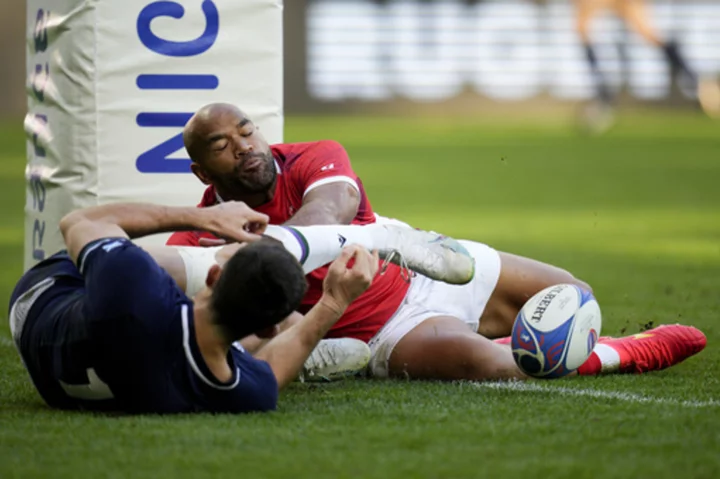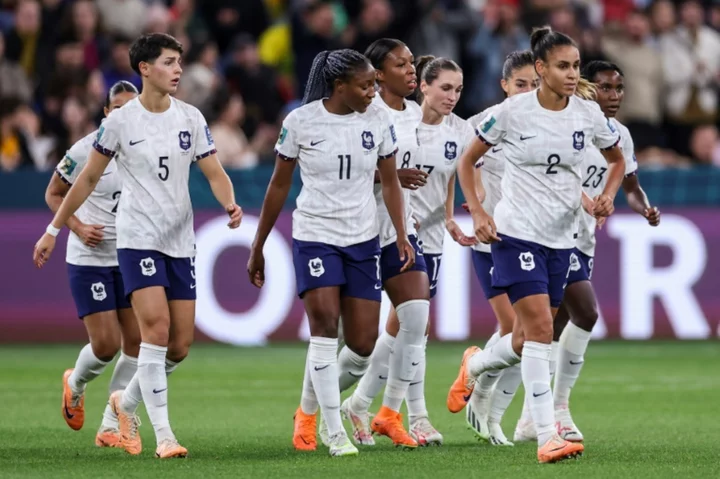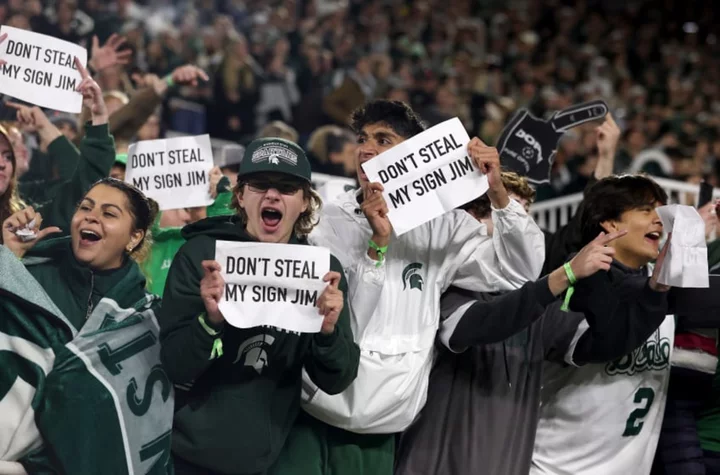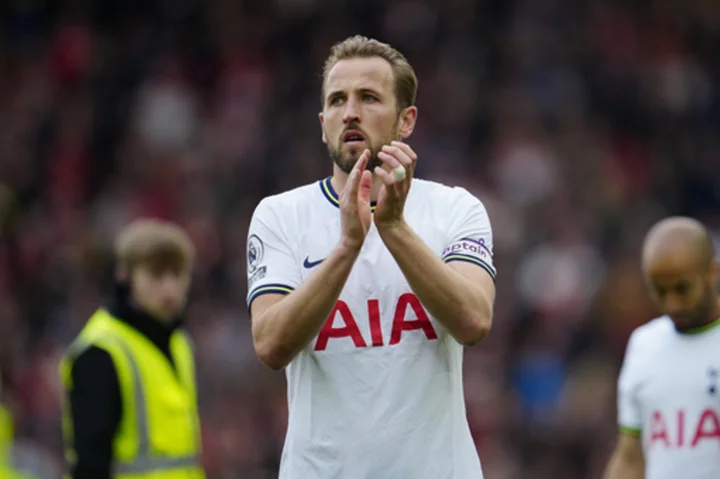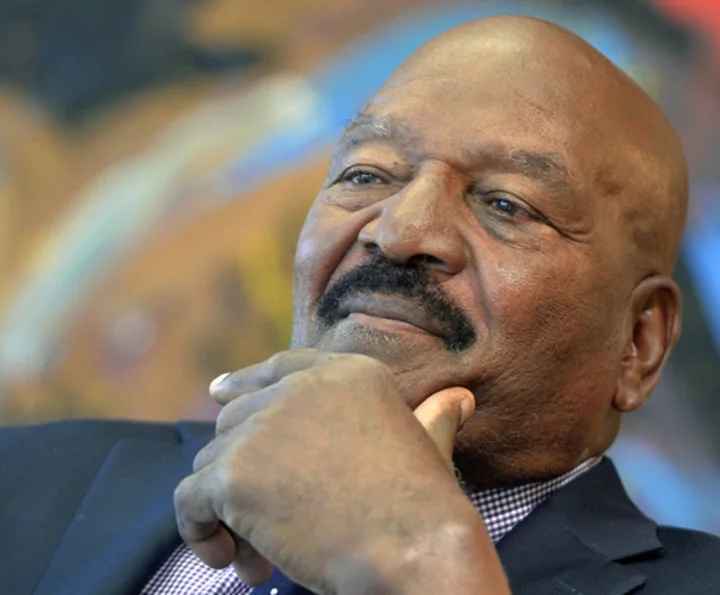PARIS (AP) — World Rugby CEO Alan Gilpin defended the bunker review system at the Rugby World Cup after a red card was not issued for Tonga winger Afusipa Taumoepeau's hit on Scotland captain Jamie Ritchie last weekend.
Taumoepeau was given a yellow card for the first half incident last Sunday, but it wasn't upgraded to red apparently because of Ritchie’s slight duck into the tackle. The captain subsequently failed a head injury assessment, which means a mandatory 12-day rest.
Many observers thought the upright hit merited a clear red card and the bunker review — where officials have eight minutes to change their initial decision — should clearly have seen that. But Gilpin said mitigation, such as the height of the tackle, comes into it and defended the system.
“The foul play review officer in the bunker is obviously seeing more angles than television viewers at home or people in the stadium are seeing, and we think there is great consistency there and the bunker is working well,” Gilpin said on Wednesday at the tournament organizers' weekly review.
“The strive for consistency and understanding is ongoing as a sport, and as a complex sport with (a) collision area. Hopefully, what everyone is seeing is (that) there is clearer communication now on field and therefore more broadly about the decision being made in the bunker, as it comes back to the referee.”
From the start, however, the tournament generated much debate about the inconsistency of match officials giving cards for head contact, after World Rugby said player welfare was its top priority.
England flanker Tom Curry was handed a three-game ban after his sending-off for a dangerous tackle against Argentina when his yellow card was upgraded by a bunker review.
But no action was taken against South Africa center Jesse Kriel for his head-on-head collision with Jack Dempsey in the victory against Scotland. The incident was missed by the referee and Television Match Official. Plus, Chile captain Martin Sigren was guilty of a similar tackle to Curry’s during the loss against Japan but he got a yellow card.
Gilpin also addressed the issue of whether France scrumhalf Antoine Dupont would be allowed to wear a protective face mask if he returns to play.
Dupont underwent facial surgery to repair the fracture he sustained last Thursday from a head-on-head tackle in a 96-0 victory over Namibia.
“At the moment it's hypothetical, there haven’t been any direct discussions with the French team around a mask for Antoine," Gilpin said. “The laws and rules are very clear on face masks ... a maximum thickness of five millimeters. And what's important is that it can't be hard covering material."
With the tournament reaching the halfway stage, Gilpin praised the level of play and the general atmosphere.
Stade de France on Saturday was a sea of green from Ireland and South Africa supporters for their team's titanic tussle. Ireland edged a classic 13-8 and the atmosphere was as good as when France beat New Zealand 27-13 on the opening night.
“I felt it was a real privilege to be there," Gilpin said. "I don’t think in many, many years of Rugby World Cups, I’ve seen an atmosphere like it given that the host nation weren’t playing.
“We have seen some incredible performances, not just from the likes of Ireland, South Africa, France etc, but also from what we call the performance unions, those that are outside the Six Nations and Rugby Championship, despite COVID and the impact that had for, in many cases, two years on teams’ preparations."
Still, there were more reports of fans experiencing problems.
Wales and Australia supporters were reportedly stranded after their match in Lyon on Sunday and could not get back into the city center. The stadium is about 11 kilometers (seven miles) from Lyon's center and is served by only one tram line. Similar congestion problems surfaced there after games at soccer's European Championship in 2016 and when Lyon hosted the Europa League final in 2018.
There were also reports of beer and water running out at some stadiums and difficult access to and from venues.
“There are definitely a number of fans who have had challenging experiences,” said Gilpin, who said work with organizers was ongoing to make things smoother.
Crowd access problems in Marseille and Bordeaux on the opening weekend were a bad look for the tournament and France, a year after the Champions League final catastrophe in Paris and a year before the Olympic Games in Paris.
But tournament director Michel Poussau played down the more recent reports and said “99%” of fans were able to access matches smoothly.
“We take fans’ experience to heart," he said. “We want to ensure that it is the best experience possible.”
Poussau said one million fans have attended matches across the nine venues and so far there have been 100 million television viewers in France — more than the audience for the whole of the 2019 tournament in Japan, which was broadcast mainly in mornings.
Organizing chairman Jacques Rivoal added that viewing figures have even shot up in Germany, which is not even playing at the tournament.
___
AP Rugby World Cup: https://apnews.com/hub/rugby

